The Kremlin made no sign of being upset with Aliaksandar Lukashenka. Kremlin narratives in Belarusian media – February 2021
Overview
We monitored and analysed 859 articles* (414 Belarusian and 445 Russian) published by leading media outlets in Russia and Belarus between February 1st and February 28th, 2021, concerning Belarusian-Russian relations. Media monitoring focused on Russian publications referring to Belarus, Belarusian publications quoting Russian media outlets, and top-ranking articles indexed by Google News and Yandex News when searching for «Belarusian-Russian relations» ** .
This report covers such topics as who borrowed content from whom, what information sources were used, and which references the media most frequently mentioned or quoted. Finally, we analysed and compared the key messages communicated by Belarusian and Russian media outlets.
Major findings
The most popular source of information about Belarusian-Russian relations was Lukashenka (7.5% and 15.5% of information sources in Belarusian and Russian media, respectively).
Former presidential candidate Sviatlana Tsikhaounskaya was often quoted in Russian media when they covered Belarus, leading us to conclude that the Belarusian political crisis was on the agenda and
she was regarded as the only ‘interesting’ alternative for the general public.
Lukashenka and Putin were the most mentioned public figures in the media of both states when covering Belarusian-Russian relations. However, Kremlin spokesperson Dimitry Peskov was a more frequent ‘voice of Kremlin’ for the Russian media. In the Belarusian media, this role was given to Lukashenka and journalists from his entourage.
The narrative that «Lukashenka deceived Putin and has not started a constitutional reform/transit of power/public dialogue» was twice as frequent in Belarusian media as compared to Russian, leading to a conclusion that this was instead ‘wishful thinking’ of Belarusian media commentators, given that the Kremlin did not articulate «offence at deception.»
Media of both states extensively covered the redirection of Belarusian goods in transit to Russian ports in place of Lithuania.
Timeline of events in January 2021
On February 8th, Belarus and Russia resumed railway communication between the two states, suspended in March 2020 due to COVID-19.
On February 10th, Russian Ambassador to Belarus Dmitry Mezentsev stated in an interview with RIA Novosti that “Russia, having heard the request of the Belarusian side, has fulfilled all obligations related to oil supplies in the past year. This fully applies to the obligation to pay for the so-called ‘dirty’ oil.» (On January 29th, the chairman of the Belneftekhim concern, Andrei Rybakov, in an interview with Vestnik Belneftekhim, stated: “The issue of compensation to the Belarusian side for losses incurred when processing low-quality Russian oil remains unresolved.») According to RIA Novosti, in late January 2021, Russian oil companies began to pay compensation for the contaminated oil delivered in the spring of 2019; the total amount of payments will be about $60 million.
On February 10th, Transneft representative Igor Demin said in an interview with TASS that an increase in the tax burden on the transit of Russian oil and oil products through Belarus from 2021 could create preconditions for bankruptcy and further nationalisation of Transneft’s subsidiary, Zapad-Transnefteprodukt, which supplies petrochemicals from Russian and Belarusian refineries to Hungary and Latvia (via Belarus). “The possible transfer of UE Zapad-Transnefteprodukt from the ownership of the Russian Federation to the ownership of the Republic of Belarus will lead to significant financial losses for the Russian Federation (at the moment, the value of the company’s assets is 6.7 billion rubles),” he said.
On February 11-12, the All-Belarusian People’s Assembly convened by Lukashenka was held in Minsk. During the meeting, Lukashenka and high ranking officials made some policy statements about the situation in Belarus, discussed future development prospects, and announced changes in foreign policy (proposing to abandon the constitutional principle of neutrality). It was also announced that a constitutional referendum could be held in 2022 together with local elections.
On February 11th, KGB head Ivan Tertel said: «We have reliable information about the intention of persons to commit terrorist acts on the territory of our country.» On April 13th, the KGB announced the arrest of the head of the Belarusian Popular Front Party Grigory Kostusev in Shklou and of the Belarusian literary critic and publicist Alexander Feduta and American lawyer Yuri Zenkovich (the latter has Belarusian and American citizenship) in Moscow. They are suspected of preparing an “armed rebellion” in Belarus and an “assassination attempt” on Lukashenka. The Russian FSB reported that the putsch was scheduled for May 9th, while the KGB suggested early July.
On February 16th, Lukashenka awarded the State Secretary of the Union State Grigory Rapota with the Order of Honor. Subsequently, Rapota resigned from this post and was succeeded by former Russian Ambassador to Belarus Dmitry Mezentsev.
On February 19th, Belarus and Russia signed an intergovernmental agreement on the transhipment of over 9.8 million tons of Belarusian oil products via Russian ports. The deal will be valid until December 31st, 2023, with the option for automatic renewal. The document envisages contracts on the take-or-pay principle. If the shipper provides transhipment in a volume less than agreed, the sea terminal still receives payment for the entire agreed quantity.
On February 19th, the US State Department announced visa restrictions upon 43 Belarusian nationals accused of undermining democracy in Belarus. The list includes, amongst others, “high-ranking officials from the justice sector, heads of law enforcement agencies, as well as ordinary [competent authorities] personnel who detained peaceful demonstrators” and treated them inappropriately, “judges and prosecutors” whose actions led to sentences and imprisonment for protesters and journalists, as well as the administrative staff of higher educational institutions, who “threatened students for participating” in demonstrations.
On February 20th, a telephone conversation took place between the Prime Ministers of Belarus and Russia, Raman Halauchenka and Mikhail Mishustin. According to the press service of the Russian government, “Particular attention was paid to the implementation of the intergovernmental agreement on the transportation and transhipment of Belarusian oil products intended for export through the seaports of the Russian Federation, signed on February 19th, 2021, in Moscow. In addition, Mikhail Mishustin and Roman Golovchenko exchanged views on joint measures to counter coronavirus infection. »
On February 22nd, talks between the leaders of Belarus and Russia, Lukashenka and Putin, took place in Sochi.
On February 23rd, further to the negotiations held on February 22nd in Sochi, Lukashenka and Putin discussed by phone the strengthening of joint defence systems, military-industrial complex (MIC) cooperation, information management, and the tax system.
On February 23rd, Deputy Chairman of the Security Council of the Russian Federation Dmitry Medvedev also spoke on the phone with Lukashenka.
On February 25th, Belgazprombank received a Eur 60 million long-term credit line from the Russian Gazprombank. This was the first credit tranche received by a Belarusian bank from its parent bank since June 2020. This happened immediately after the restoration of the operational control by Belgazprombank shareholders.
On February 26th, Viktor Lukashenka was elected as president of the National Olympic Committee. On March 8th, the International Olympic Committee (IOC) decided not to recognise Viktor Lukashenka as the new president of the Belarusian NOC as a temporary interim measure. On December 7th, the IOC Executive Board imposed sanctions against the leadership of the NOC of Belarus, as “the leadership of the NOC did not properly protect Belarusian athletes from political discrimination,” which is a violation of the Olympic Charter.
On February 26th, Belarusian Health Minister Dmitry Pinevich announced a trial batch of the Russian Sputnik V coronavirus vaccine had shipped in Belarus.
On February 28th, Sviatlana Tsikhanouskaya said in an interview with the German weekly Bild am Sonntag: “The pressure will grow day by day, and one day it will become excessive for Lukashenka, so he will leave. Lukashenka’s regime will fall this year. I think he will go in the spring.»
Analysis of information sources
Monitored Belarusian media outlets referred to 858 information sources, whilst their Russian counterparts referred to 789, including references to other media outlets, public bodies, institutions, and individuals when reporting facts and direct quotes.
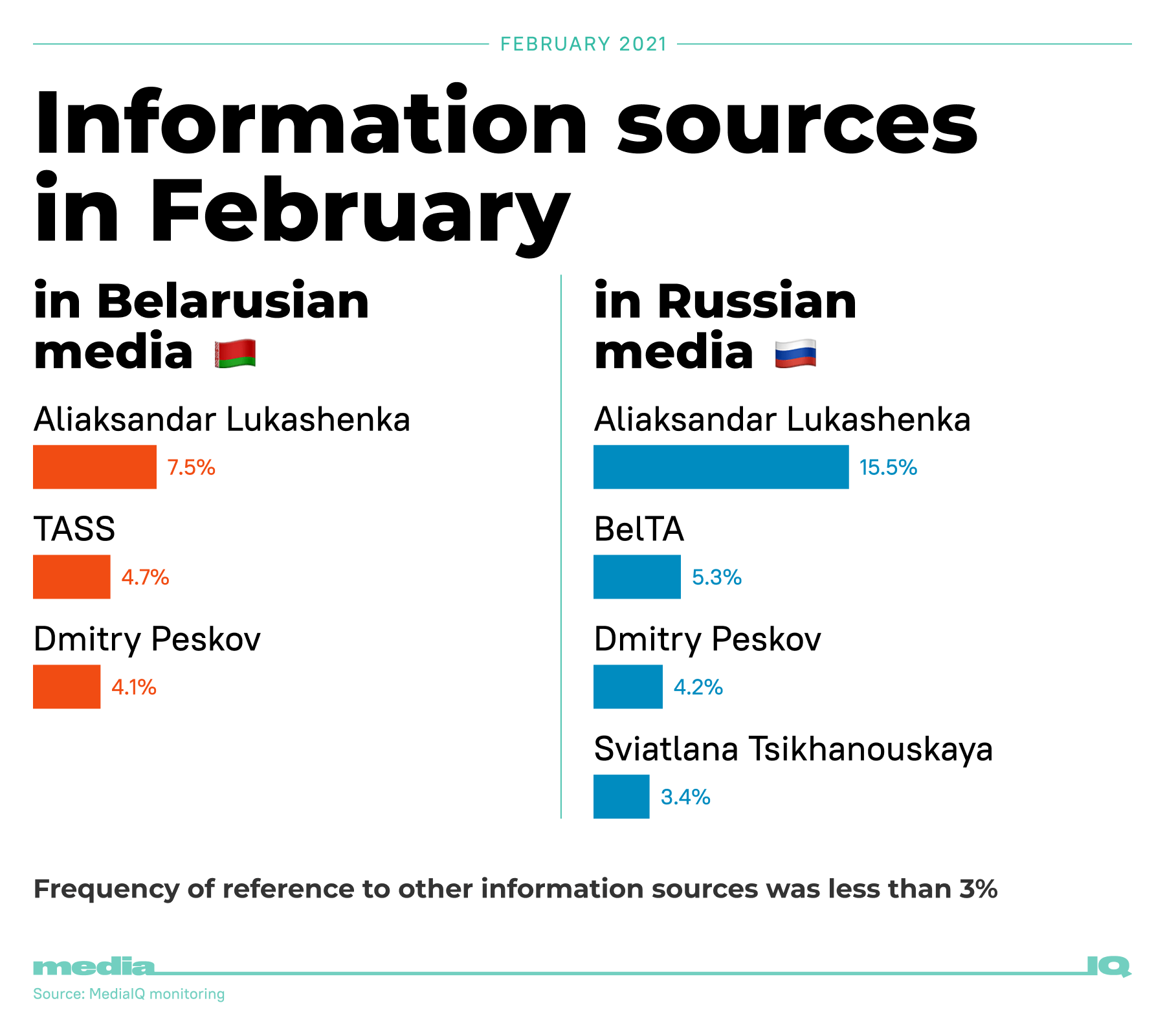
In February, Lukashenka was the most frequent source of information about Belarusian-Russian relations in the media of both states (7.5% and 15.5% of all references in Belarusian and Russian media, respectively). In January, Nailia Asker-Zade’s interview with Lukashenka on Russia 1 elevated her to among the top quoted persons regarding Belarusian-Russian relations; in February 2021, previously established trends returned. In the Belarusian media’s coverage of Belarusian-Russian ties, the Russian agency TASS resumed its position as the second most popular source of information after Lukashenka. Similarly, the Belarusian news agency BelTA returned to the second position for the Russian media.
Kremlin press secretary Dmitry Peskov was the third most popular source of information in the media of both states. He announced the meetings of the presidents and then interpreted their results.
Russian media, when covering Belarus, continued to refer to ex-presidential candidate Sviatlana Tsikhanouskaya, demonstrating their continuing interest in the Belarusian political crisis. This also indicates that no other Belarusian political player, except Lukashenka and Tsikhanouskaya, has acquired the ability to overcome the information barrier and reach a general audience.
Key figures in media articles
In respect of integration-related matters, the Belarusian Media mentioned 343 persons, and Russian, 271. We include people identified by their first and last names regardless of whether an article was directly about them. We did not assess who played a greater or lesser role in the story; the score is determined by the number of documents mentioning a particular person in the reporting period.
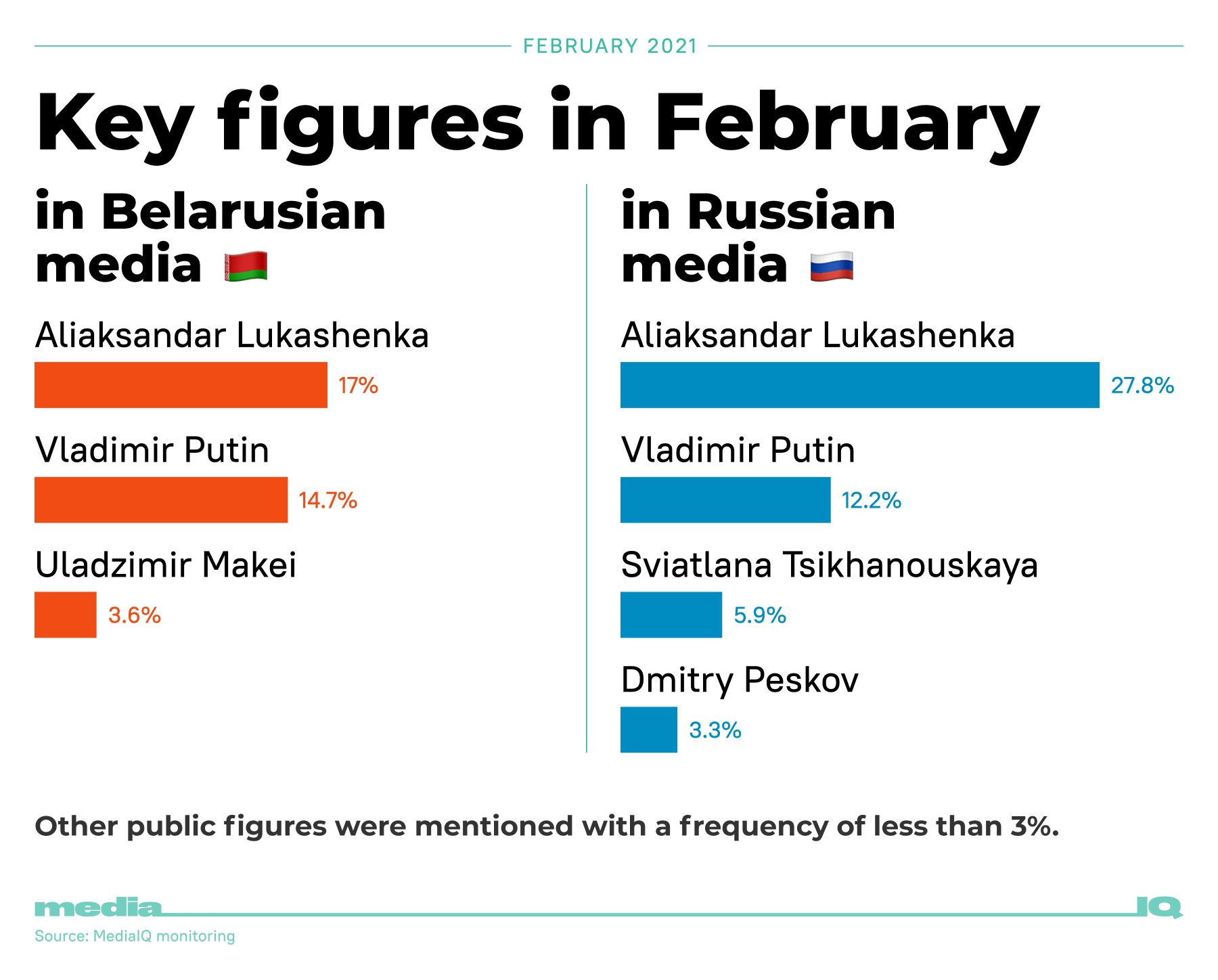
Lukashenka and Putin were the most frequently mentioned public figures in the media of both states. Putin’s views were primarily relayed via Kremlin press secretary Peskov, who interpreted the preparation, course, and results of the Belarusian-Russian summit. For the Belarusian media, this role devolved to Lukashenka and the journalists of the presidential pool who reported from Sochi.
The profile of Belarusian Foreign Minister Makei in the Belarusian media coverage could be explained by at least three factors: Makei’s speech at the All-Belarusian People’s Assembly proposing to amend foreign policy doctrine, his interview with the Russian RBC reprinted by BelTA, and his participation with his wife in the program “Markov. Nothing personal” on the Belarusian ONT TV channel.
Analysis of messages communicated
In February, narrative strands in Belarusian and Russian media outlets overlapped more significantly than in the previous months, including Russian help for Belarus in tackling the coronavirus outbreak and the resumption of railroad services between the states.
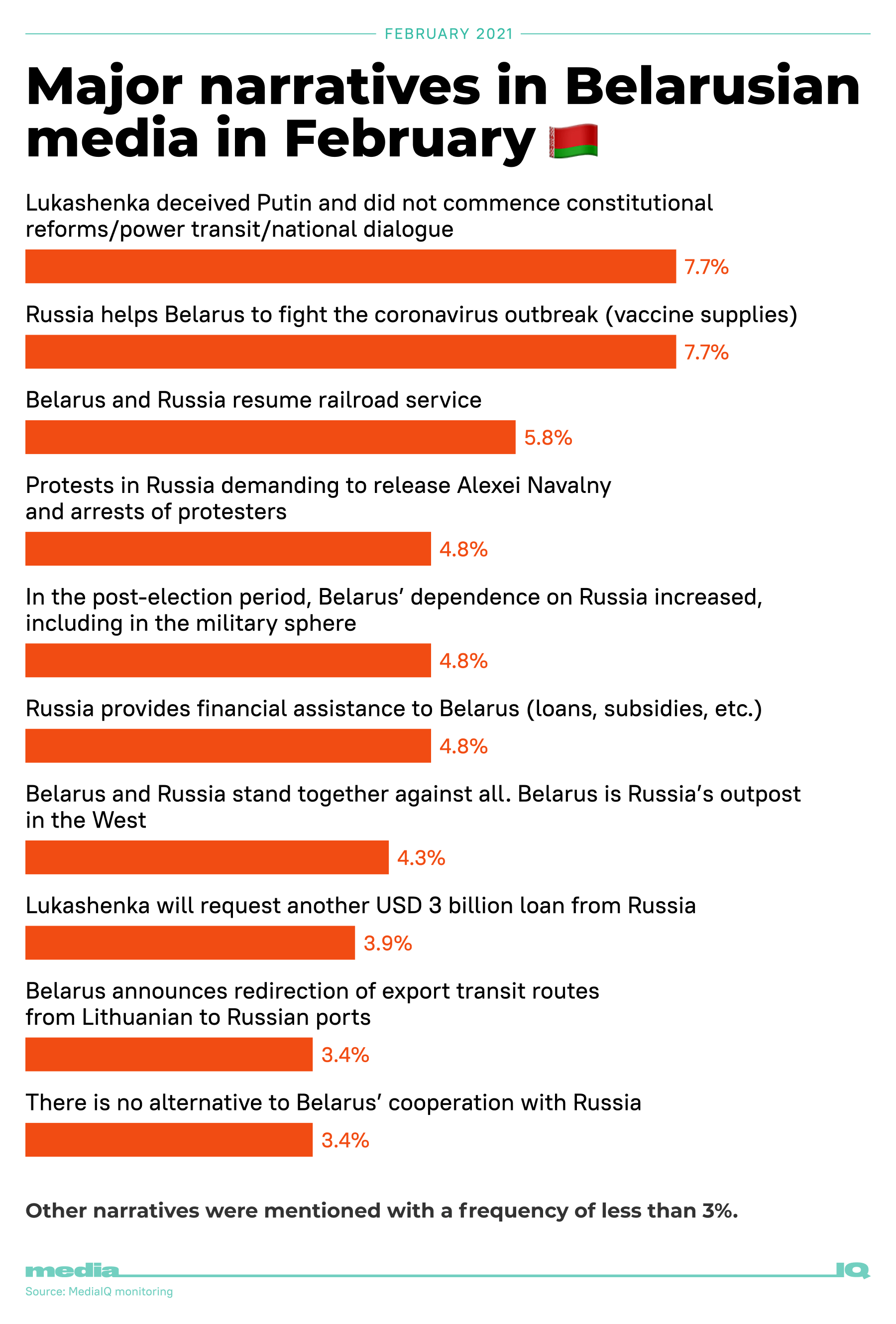
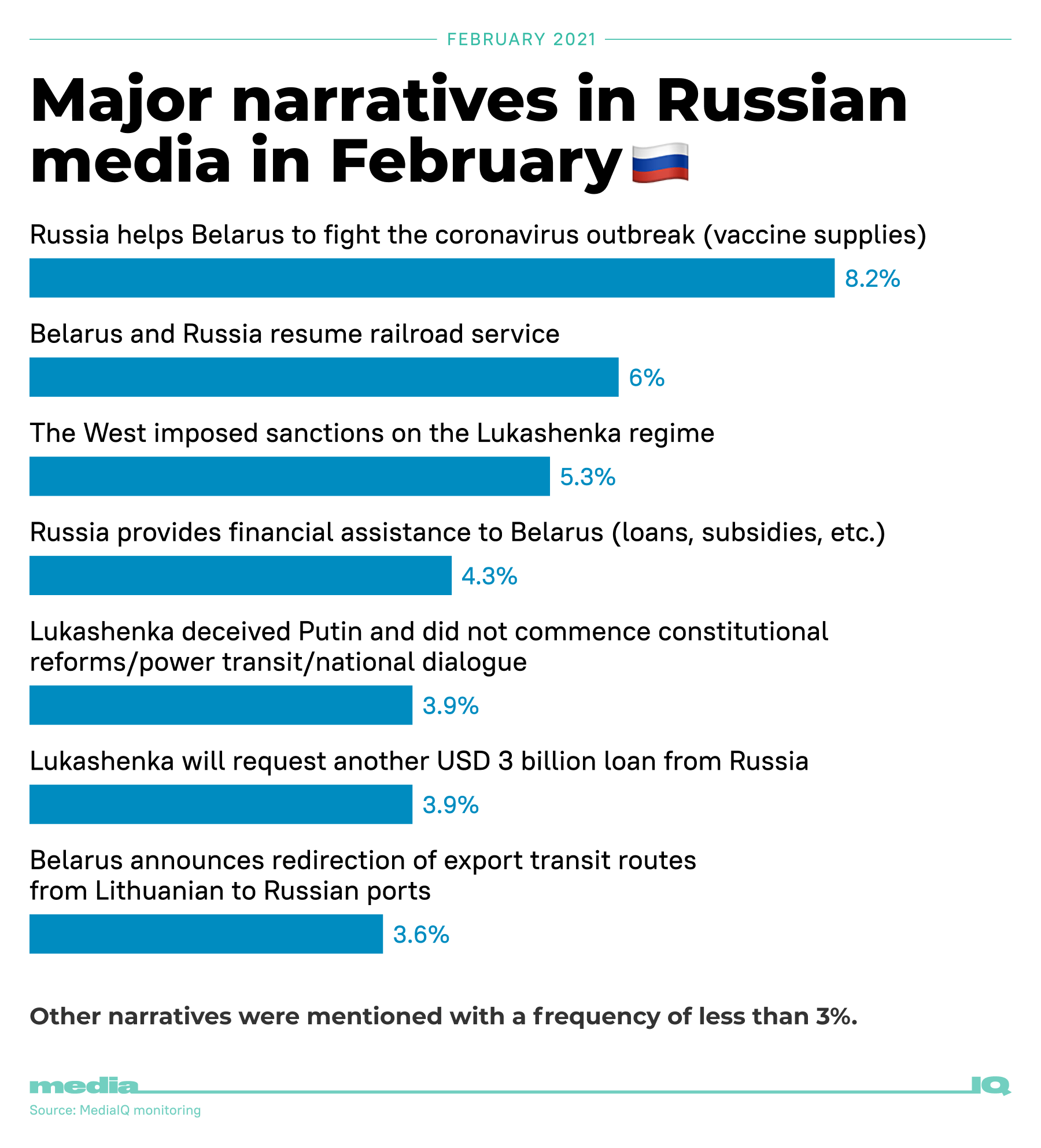
The situation with the narrative “Lukashenka deceived Putin and did not commence constitutional reforms/power transit/national dialogue” is indicative: it was twice as frequent in Belarusian media as compared to Russian, leading to a conclusion that this was instead ‘wishful thinking’ of Belarusian media commentators, given that the Kremlin did not articulate its «offence at deception.»
Journalists from both states provided extensive coverage of the redirection of Belarusian cargo traffic from Lithuanian to Russian ports.
Negative and positive reporting mirrored in both states
Analysis of less frequent narratives grouped by broader topics shows that adverse and positive reporting in February was inverted in the media of both states.
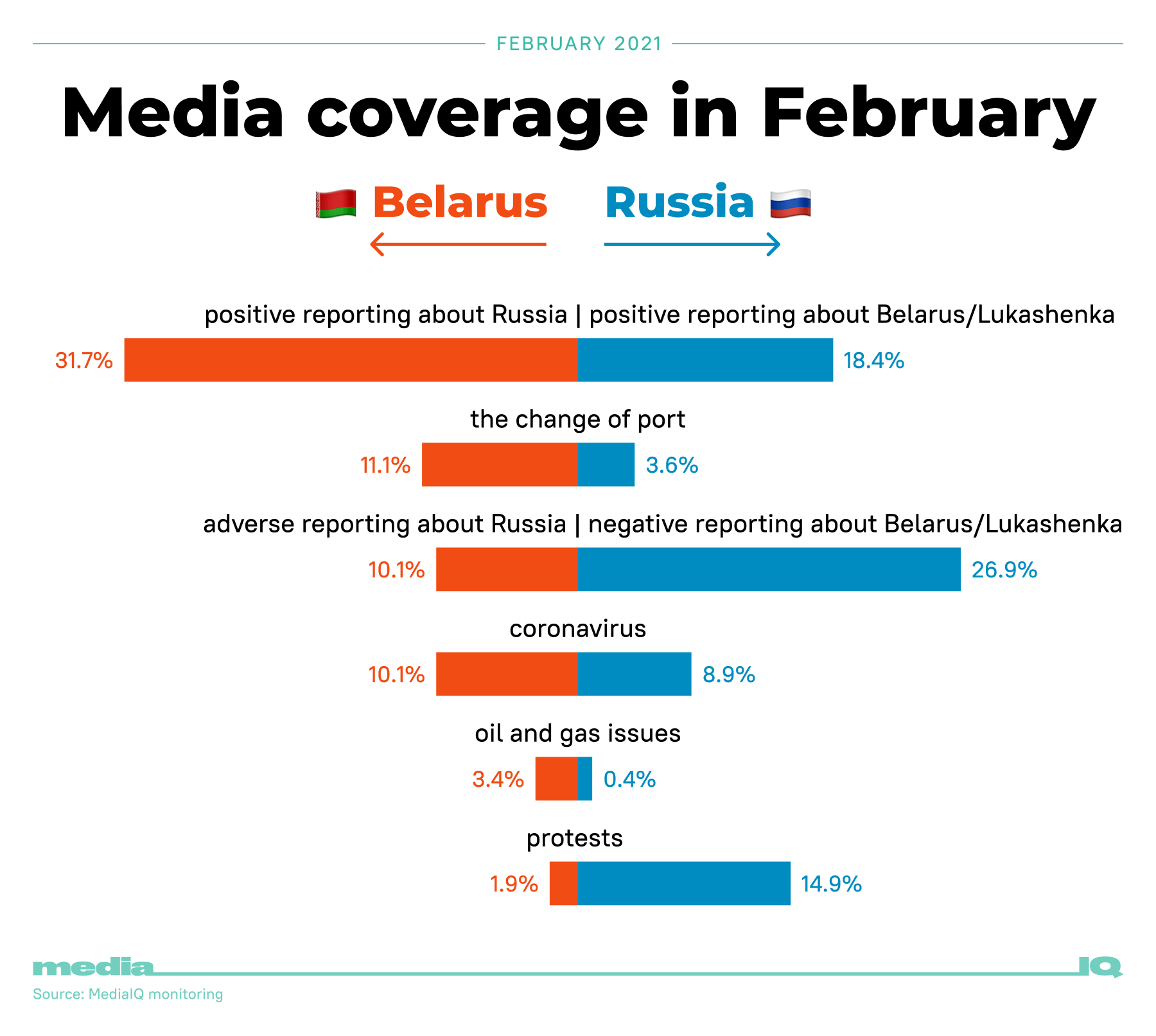
Positive reporting predominated in Belarusian media reports about Russia, whilst adverse reporting about Belarus was more characteristic of Russian media outlets. That is, in February, after a short break in January, the usual trend resumed.
A newly important topic was the redirection of Belarusian cargo traffic from Lithuanian to Russian ports. This topic was more significant for the Belarusian media.
* Due to an extensive coverage of Belarusian-Russian issues, we reduced in number the media outlets subject to monitoring.
** 414 articles in 13 Belarusian media (Belarus 1, Belsat TV, BelTA, Nasha Niva, ONT, SB. Belarus Today, Sputnik Belarus, CTB, Euroradio, Naviny.by, Onliner, REFORM.by and TUT.BY) and 445 articles in 15 Russian media (Vedomosti, Vesti.Ru, Vzgliad, Dozhd, Izvestia, Interfax, Kommersant, Moskovsky Komsomolets, Nezavisimaya Gazeta, RBC, RIA Novosti, TASS, “Ukraina.ru”, EADaily, and VTimes).
In Belarus, the most extensive coverage was provided by Naviny.by and TUT.BY (18.6% of all articles), Sputnik Belarus (14.7%) and ONT (13%). In Russia – TASS (23.6%), Ria Novosti (19.1%) and Izvestia (16%). In Belarus, four TV Channels and nine online media outlets are subject to regular Media IQ monitoring (please see the list of Belarusian media outlets in attachment 5).
